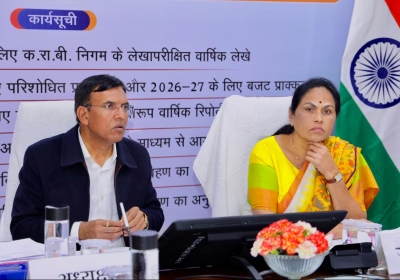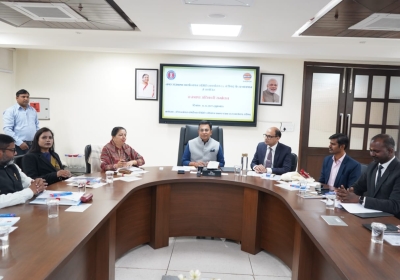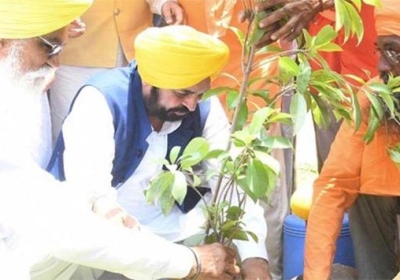
BJP promises gig worker insurance, Yamuna cleanup in Delhi poll
BJP's third Delhi Manifesto pledges gig worker insurance and clean Yamuna in 3 years
In the lead-up to the Delhi assembly elections on February 5, the Bharatiya Janata Party (BJP) unveiled the third part of its election manifesto, called the ‘Sankalp Patra.’ This manifesto includes several key promises aimed at improving life for the residents of Delhi. Union Home Minister Amit Shah announced the party's plans during a press conference, outlining important policies that the BJP would implement if it comes to power.
Key promises from the BJP
A major promise made by the BJP was to grant full ownership rights to residents of 1,700 unauthorised colonies in Delhi. This would allow people to buy, sell, and build on their properties, offering a sense of security and stability to many families living in these areas. Shah explained that this move would benefit thousands of Delhi residents who have been living in these colonies for years without legal ownership.
Another significant promise was related to gig workers. Shah announced that the BJP would create a welfare board for gig workers. The government would provide gig workers with ₹10 lakh insurance and ₹5 lakh accident cover. This initiative is designed to improve the welfare of gig economy workers, who often lack job security and health benefits.
The BJP also promised to tackle the long-standing issue of Yamuna pollution. Shah stated that if the party comes to power, they will clean the Yamuna river within three years. The promise to clean the river aims to address the ongoing environmental concerns related to the river’s pollution, which has been a major issue for residents of Delhi.
ALSO READ: RG Kar Case: victim's parents and doctors demand CBI take over probe
ALSO READ: Parliamentary Panel discusses demand for NRI Representation in Indian Parliament
Another key promise made by the BJP was to implement the Ayushman Bharat scheme as soon as they form the government. Shah promised that the scheme would be introduced in the first Cabinet meeting, providing free medical treatment worth ₹5 lakh for eligible residents of Delhi. Additionally, the Delhi government would provide an extra ₹5 lakh worth of free treatment, bringing the total to ₹10 lakh. This initiative is intended to make healthcare more accessible for the people of Delhi, especially those from lower-income backgrounds.
Financial assistance for women and families
The BJP’s manifesto also includes several promises aimed at providing financial assistance to women and families. The party announced that every poor woman would receive ₹2,500 every month as financial aid. Pregnant women would also receive ₹21,000 in aid, along with six nutrition kits to support their health and well-being during pregnancy.
The BJP also promised to provide subsidised LPG cylinders to households in Delhi. The price of the cylinders would be reduced to ₹500, and every household would receive an additional free cylinder on Holi and Diwali, two major festivals in India. These steps aim to alleviate the financial burden on families and ensure they have access to essential services.
In his address, Amit Shah also took the opportunity to criticise Delhi Chief Minister Arvind Kejriwal and his Aam Aadmi Party (AAP). Shah called Kejriwal a “liar” and accused him of failing to fulfill promises made to the people of Delhi. He pointed out that Kejriwal had claimed that Mohalla clinics would provide specialist doctors and conduct medical tests, but these promises had not been met.
Shah claimed that the people of Delhi were asking whether operations and x-rays were being conducted at Mohalla clinics, and whether specialist doctors were available. He further criticised the AAP government for not doubling the number of beds in hospitals as promised. Shah alleged that the Mohalla clinics were involved in fake tests and scams, which, according to him, was part of Kejriwal’s failure to deliver on his promises.
The BJP’s manifesto outlines a broad vision for Delhi, with a focus on welfare and development. The party’s promises aim to address the concerns of Delhi’s residents, from improving healthcare and education to providing financial assistance to women and families. By offering solutions to long-standing problems such as unauthorised colonies and river pollution, the BJP hopes to make significant changes that will improve the quality of life for people in the capital.
The party's manifesto also highlights its commitment to supporting gig workers, a growing segment of the workforce in India. By creating a welfare board and offering insurance coverage, the BJP seeks to improve the livelihoods of those working in the gig economy. This is an important step towards ensuring that all workers, regardless of their employment status, have access to basic protections and benefits.
The Ayushman Bharat scheme is a flagship healthcare initiative launched by the government of India. It aims to provide health insurance to low-income families, ensuring that they can access medical treatment without financial hardship. If implemented in Delhi, the scheme would provide significant relief to thousands of families who struggle to afford medical care. By offering up to ₹10 lakh worth of treatment, the BJP hopes to address the healthcare needs of Delhi’s residents, especially those who are most vulnerable.
By implementing the Ayushman Bharat scheme quickly, the BJP aims to make healthcare more accessible and reduce the financial burden on families. This promise is in line with the party’s broader goal of improving public services and providing better opportunities for all residents of Delhi.
The BJP’s focus on providing financial aid to women and families is another key feature of its manifesto. By offering monthly financial support and additional aid during pregnancy, the BJP aims to improve the economic well-being of women and children. The party's promise to provide subsidised LPG cylinders and free cylinders on major festivals is also designed to ease the financial burden on families, particularly those in lower-income groups.
These promises reflect the BJP’s understanding of the challenges faced by women and families in Delhi. By providing targeted financial assistance, the party hopes to address some of the most pressing concerns of the electorate.
The criticism of Kejriwal’s Government
The criticism of Arvind Kejriwal and his government is a central part of the BJP’s campaign. By accusing Kejriwal of being a “liar” and failing to deliver on his promises, the BJP aims to paint the AAP as ineffective and out of touch with the needs of the people. Shah’s comments highlight the BJP’s strategy of contrasting its own promises with the alleged failures of the AAP government.
The BJP’s focus on healthcare, education, and welfare is intended to present the party as a viable alternative to Kejriwal’s leadership. By addressing key issues such as pollution, healthcare, and financial support for women and families, the BJP hopes to appeal to voters who are dissatisfied with the current government’s performance.
The BJP’s third manifesto for the Delhi assembly elections promises a range of initiatives aimed at improving the lives of Delhi residents. From granting ownership rights in unauthorised colonies to cleaning the Yamuna river, the party’s promises focus on addressing long-standing issues in the capital. The manifesto also highlights the party’s commitment to supporting gig workers, providing financial aid to women, and improving healthcare through the Ayushman Bharat scheme.
As the elections approach, the BJP’s promises are likely to shape the political discourse in Delhi. With criticism of the AAP government and a focus on welfare and development, the BJP aims to present itself as the party that can deliver real change for the people of Delhi.





